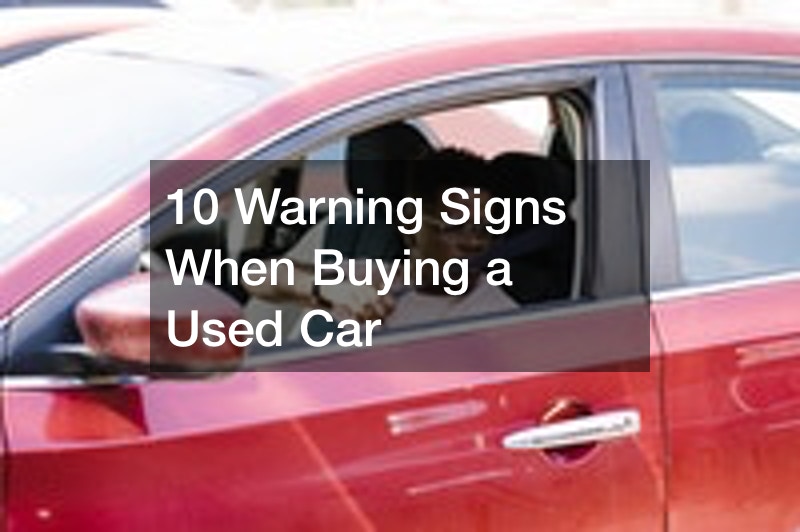
Buying a used car can be a harrowing experience. Other than their home, a car is the biggest purchase most Americans will make. A car is necessary for work, school, and errands.
Not all used car dealers are the same. Some used car dealers have a stellar reputation and offer excellent customer service. However, some use shady tactics and questionable practices when selling used cars. Here are ten things to watch for when buying a car from all used car dealers:
All Used Car Dealers Should Let You Take a Test Drive

A test drive is critical to know if a car is a good fit for you. A test drive can tell you whether you will be physically comfortable in the car, but will also tell you if the car will perform up to your needs.
For example, if you are accustomed to a car that has the power to pass other cars easily on the freeway, a test drive might be the only way to determine that. Similarly, if you live in a hot climate that requires a working air conditioner, test driving the car will be the best way to guarantee the AC works.
The most important purpose for a test drive, however, is to make sure the vehicle works. Nothing reveals the problems with a car better than a ten or fifteen-minute test drive. This can reveal squealing belts, clunking transmissions, and roaring mufflers. Problems like these will not only affect the price that you should pay, but can determine whether you should even buy the vehicle.
For example, unless you get an extraordinarily good deal, buying a vehicle with a bad transmission could be the start of a huge financial commitment.
Some of the things to watch for during a test drive include:
- Acceleration: The vehicle should accelerate smoothly without engine misfires. A misfiring engine could be the result of clogged fuel injectors, dirty air filter, a bad oxygen sensor, plugged fuel filter, or any of a myriad of other problems.
- Noises: You should listen for road noise. This could be a sign that the weather stripping on the doors and windows is deteriorating. It could also mean that the car is poorly insulated and noisy. In either case, you should carefully consider whether you can live with the noise levels in the car. You should also listen for any other unusual noises. Squeaks, creaks, squeals, roars, moans, and other strange noises usually mean that the car has some mechanical problems that might need fixing.
- Brakes: Bad brakes cause about 10,000 crashes every year on American roads. During the test drive, get a feel for the brakes if they feel soft, grab, or make the car shudder when you press the brake pedal, consider picking another car.
- Steering: A car that groans, clicks, or clunks when you turn the steering wheel might need repair or replacement of the steering system. A car that feels unresponsive or pulls to one side might need more work than you are willing to pay for.
- Suspension: When a car’s ride feels spongy or springy, it might need suspension work. Similarly, if a car bottoms out on bumps or is too stiff to absorb bumps, you might consider a different vehicle.
All used car dealers should allow you to test drive a car. More importantly, all used car dealers should allow your test drive to last as long as you want. If you want to drive the car on the freeway, you should be allowed to. If you want to drive over speed bumps or a bumpy road, you should be able to do so. When a used car dealer tries to prevent or limit a test drive, you should be wary about the vehicle.
All Used Car Dealers Should Let You Inspect the Car for Signs of a Crash
Car accidents are traumatic events. A car that has been in an accident can have problems for the rest of that car’s life. For example, cars that have been in an accident have an increased risk of corrosion and wear. But these problems might not surface until years after the accident. Knowing whether a car has been in an accident will help you set your expectations about how long the vehicle will last and the problems it will have.
Some signs of a car accident include:
- Misaligned doors, windows, and trunk: If the doors, windows, or trunk do not close correctly or look like they are ajar even when they are closed, the car might have been in a crash.
- Mismatched paint: A car with a panel that is brighter (or duller) than the rest of the car might have been in a crash.
- Body rust: A collision can scrape paint off the vehicle. Touch-up paint can wear differently than factory paint, leaving rust patches.
- Uneven tire wear: Uneven tire wear can indicate a bent frame, bent axles, or a misaligned suspension. In any case, it might have been caused by a collision.
All used car dealers should allow you to inspect the body for signs of a car crash. A car crash can lower the value of the vehicle substantially, so you should have the right to ensure the vehicle is free from any problems that might linger after a crash.
All Used Car Dealers Should Let You Have Your Mechanic Inspect the Vehicle

During your test drive, you should consider visiting your independent mechanic for a quick inspection. A mechanic can help you identify any problems with the car before you commit to buying it.
The main risk of buying a used car is the likelihood that the vehicle will need repairs. Repairs for a used car can be substantial, particularly if it needs work on its engine or transmission. A mechanic can examine a vehicle for obvious signs that the engine or transmission needs work. Some signs a mechanic might look for include:
- Leaks: Oil or transmission fluid leaks might be a sign of engine or transmission wear.
- Rough shifting: A vehicle that shifts roughly might need a new transmission.
- Burning smells: A quick way for a mechanic to check a used car is to open up the hood and sniff. Burning smells usually mean that the engine or transmission is overheating or leaking somewhere.
70% of Americans shopping for a new car would consider buying a used car. The main reason is the price. Used cars are substantially less expensive than new cars. However, nothing is more dispiriting than taking out a car loan for a used car, then immediately requiring repair because the used car breaks down.
All used car dealers should let you take the used car to your mechanic. If your used car dealer objects to an independent examination, the dealer might be hiding something.
All Used Car Dealers Should Show You the Vehicle Identification Number (VIN)
The VIN appears in multiple places on the vehicle and on the title. Knowing the VIN before you buy the vehicle is important for a few reasons:
- Stolen vehicle: The VIN will tell you if the vehicle has been reported stolen.
- Totaled: You can search the VIN to find out if the vehicle has been reported totaled.
- Recalled: Manufacturers report recalled vehicles by year, model, and VIN.
- Rental vehicle: VIN searches will tell you who the prior owners were and whether the vehicle was offered as a car for rent. Rental vehicles often have high usage and might not have much life remaining.
If the vehicle falls into any of these categories, you should consider buying a different car. Even if a vehicle was repaired after a theft, recall, major accident, or use as a rental, you might consider a different model or year. There are plenty of used vehicles on the market, and you can probably find one that has not been handled roughly, damaged, or defectively manufactured.
All Used Car Dealers Should Show You the Title
You should always ask to inspect the car’s title before making an offer. Without the title in hand, the dealership might not even have legal ownership of the vehicle. The title ensures that the dealership has the right to sell the car to you.
This also avoids the sticky situation in which the legal owner reports the vehicle stolen, even though it was legitimately acquired by the dealership. For example, if the vehicle was repossessed and resold or sold in a private transaction without the title, the original owner might falsely claim that the vehicle was stolen. However, if the dealership has the title, this claim would fail.
The title can also tell you how the dealership acquired the vehicle. Depending on the state, the title may indicate whether the vehicle was salvaged after an accident or forfeited after a tow. This information might be relevant to how much you are willing to pay for the vehicle, so you should ask to see the title of any used car you are considering purchasing.
Even more importantly, you should always take the title after your purchase the vehicle. The title, along with a bill of sale, is your evidence of ownership of the vehicle. Without the title, you risk being accused of stealing the vehicle. All used car dealers should send you home with the title when you purchase a used vehicle. Without the title, you cannot:
- Register the vehicle.
- Transfer ownership into your name.
- Obtain a car insurance quote.
As a result, you should always push back against a salesman who says the title will be mailed to you. Unless you take out a loan to pay for the vehicle, you should always take the title home with you.
All Used Car Dealers Should Answer Your Questions
When you ask questions, the salesman should openly answer every question. For example, if you ask what damage was sustained by a wrecked Corvette for sale, the salesman should do everything in his or her power to find out. Simply answering “I don’t know,” does not help you to determine the value of the vehicle or the potential for future problems.
All Used Car Dealers Should Negotiate the Price

The value of a used car is very fluid and depends on many factors including:
- The age of the vehicle.
- The make and model of the vehicle.
- The appearance of the interior and exterior of the vehicle.
- The operating condition of the vehicle.
- The auto accessories included in the vehicle.
With all of these factors, reasonable minds can differ about the value of the vehicle. For example, you might be willing to pay more for the exact vehicle that is for sale for sentimental reasons. In other cases, you might be looking for a general type of vehicle, such as a pickup truck, but not need a specific vehicle.
All Used Car Dealers Should Let You Get Your Own Financing
Most used car dealers have some relationship with a bank or finance company. In fact, the two ways used car dealers make money are:
- The difference between the sale price and the acquisition price.
- Fees split with a financing company for a used car loan.
Dealer financing is not always the best deal. You should gather as much documentation as possible about the interest rate, fees, and terms of the dealer loan, then shop around to find the best deal possible. RV loans, for example, can be obtained from banks, credit unions, online lenders, savings and loans, and RV dealers.
All used car dealers should allow you the time to find your own financing. If the salesman pushes you to accept dealer financing or lose the vehicle, you should consider walking away. This probably means the salesman will make money off the loan and cannot give you objective advice.
All Used Car Dealers Should Let You Leave the Dealership
Used car salespeople are trained in negotiation techniques. Some of these are legitimate and some border on psychological warfare. One common pressure technique is to tell you that an offer expires if you leave the dealership or that they already have another offer on a custom car you really want. If a salesperson uses this pressure technique, you should seriously consider whether you want to do a deal with that dealership.
All used car dealers should let you leave the dealership. Buying a car, taking out a car loan, trading in your vehicle, and other decisions you have to make will require some reflection and thought. If you need time to make those decisions, you should feel confident in walking away from the dealership.
All Used Car Dealerships Should Keep Their Word

Used car salespeople have a bad reputation. They have a reputation for:
- Lying about the condition of a vehicle, value of a trade-in, or fees you will be charged.
- Misleading you about the financing options.
- Pressuring you to buy a car when you are not prepared to do so.
- Tricking you into spending more than you can afford.
The line between fraud and puffery is narrow. If a salesperson makes a material misrepresentation, you might have been defrauded. For example, if a salesperson says a car is in perfect condition, and you later find out from a car accident attorney that the car was totaled in a wreck before you bought it, the salesperson might have committed fraud.
Buying a used vehicle does not need to be stressful. If you understand what to watch out for, you can buy the right vehicle at a fair price.



